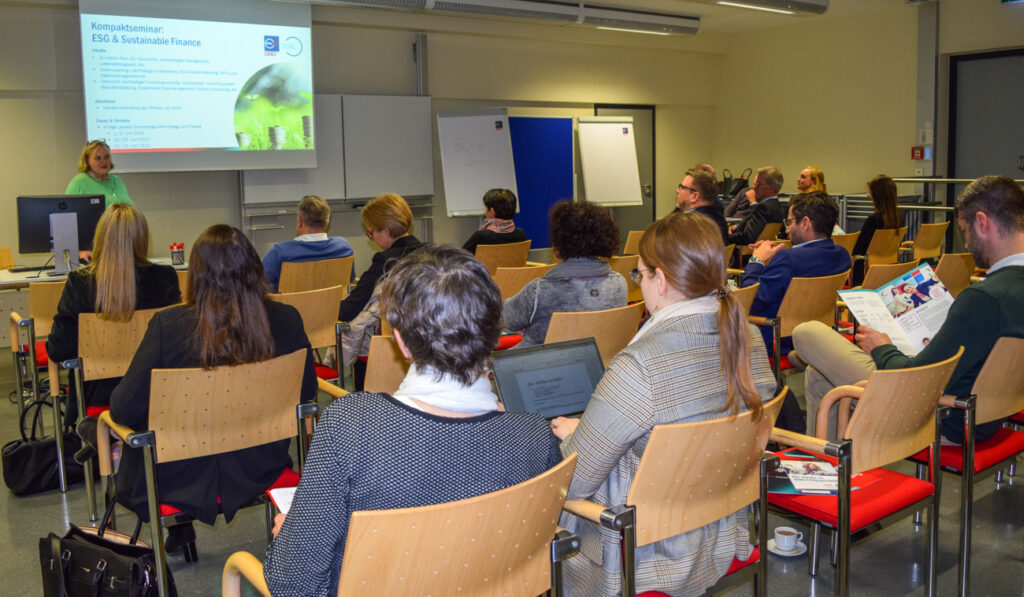With lively participation from an interested audience, we spent an afternoon looking at how ESG & Sustainable Finance will influence existing processes & structures in companies. And in particular, what job and career prospects will be opened up as a result. If we look at the numerous job postings, we can already assume that ESG experts & employees with ESG expertise are in high demand.
A brief overview of the individual presentations can be found here:
Heidrun Kopp began by discussing the new regulatory framework, and in particular the amount of “job postings” seeking ESG experts for all corporate divisions. We can also expect to see entirely new job profiles, such as the Chief Sustainability Officer.
Lars Maydell (Maydell Advise), who has been successfully coaching top managers for many years, impressively explained the competencies that managers, employees and ultimately companies need in order to make the “transition” to a climate-neutral organization. ESG cannot be done exclusively by one department, it requires a systemic view, and the cooperation of many colleagues – across divisions and departments.
Günther Hanslik, partner at CMS Attorneys at Law, has managed to clearly present the essence of sustainability risks and the importance of ESG in the financing sector. Managing financing flows through new lending criteria offers an opportunity for many companies, and could become a challenge for others. In any case, up-to-date technical knowledge for managing such transactions is needed on both sides: the credit institution and the company.
Sustainability is always accused of being something that everyone can imagine, but not necessarily the same thing (@Votaw). The unified, European classification of what is a sustainable economic activity – defined in the EU taxonomy – was presented by Stefan Sengelin (BMK). Topics from the EU Action Plan, Green Deal, the 6 environmental goals to the 9 chapters and sub-chapters of the EU Taxonomy were discussed. Quiz questions before individual chapters also challenged professionals among the participants, and led to lively discussions when solved.
In the future, sustainability will be determined by data, facts & figures, including the respective C02 footprint that companies create in their production. Miriam Rieger (ClimatePartner) explained to us what is behind scope 1, 2 and especially 3 with regard to carbon accounting. We learned that these calculations are quite demanding and that it is also possible to calculate the carbon footprint of current/savings accounts and funds. An interesting new job description in the financial sector.
Non-financial reporting in the form of the new EU directive (CSRD – Corporate Sustainability Reporting Directive) was elaborated by Sanela Terko and Matthias Hrinkow (both BDO Austria). The changes will lead to a jump in the number of companies that have to report non-financial information in the annual report (management report) in Austria: from 80 companies now to around 2,000 companies. This means that it is no longer just the “really big ones” that are affected and will have to deal with EU taxonomy, carbon accounting and ultimately non-financial reporting.
Finally, we also got an insight into what the supply chain law discussed at EU level (in Germany in force since January 2023 as “Lieferkettensorgfaltspflichtengesetz”) means in concrete terms in a company. Tanja Dietrich-Hübner from the REWE Group (including Billa and Billa Plus) clearly demonstrated what processes and structures are required in order to meet ecological and social responsibility in the global supply chain. The expertise of numerous employees is required along the process.
The Vienna Management Academy by FHWien der WKW has the right continuing education program for all these requirements: from the 6-day Compact Seminar: ESG & Sustainable Finance to the 3-semester MBA in Sustainable Finance Management.
Questions and discussions among each other and with the lecturing experts ensured a lively exchange of experiences during the presentations and also at the subsequent get together.
